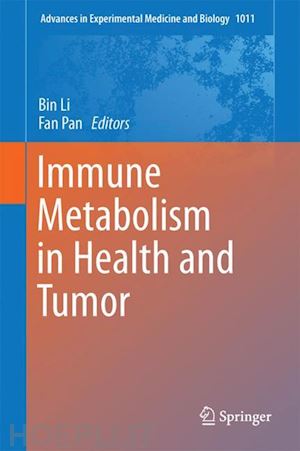
Questo prodotto usufruisce delle SPEDIZIONI GRATIS
selezionando l'opzione Corriere Veloce in fase di ordine.
Pagabile anche con Carta della cultura giovani e del merito, 18App Bonus Cultura e Carta del Docente
This book offers a broad overview of the concepts and research findings in immunometabolism. The immune system is made up of numerous different cell types, pathways, and components that must be able to respond rapidly to a pathogen or cancer, but must also remain quiescent in the absence of challenges. Immune cells rely on metabolic pathways to adapt to changing environments and stimuli. Additionally, these cells can be modified in function or fate by fluctuations in available nutrients.
The chapters in this book describe ways in which immune cells utilize and are regulated by metabolic pathways. Topics include how immune-cell metabolism shapes immune homeostasis, and how dysregulation of these pathways can lead to immune disorders. In different contexts, such as a tumor microenvironment, immune-cell function and identity may be modified not only by cytokines and checkpoint molecules, but also by nutrient availability and other metabolic stimuli. Transcriptional reprogramming confers many of the changes in immune cell metabolism that are seen when a T-cell, for example, undergoes activation or functional adaptation to different environments. Lastly, immune cells can destructively or protectively participate in human metabolic homeostasis or disorders.
This book summarizes immune-metabolism from a variety of different perspectives, including the ways in which metabolic cues, pathways, and requirements of immune cells change in conditions of homeostasis and activation. The exploration of the significance of metabolic checkpoints and other cues, particularly in the context of cancer and immune disorders, may form the foundation for the development of therapeutics.
Metabolism in Immune Cell Differentiation and Function.- Metabolic Regulation of T cell Immunity.- Transcriptional regulation of T cell metabolism reprograming.- Adipose tissue-resident regulatory T cells.- Immune cell metabolism in tumor microenvironment.- Regulation of Metabolism across Different Subsets of T Cells in Cancer.- Immunometabolism in Tumour Microenvironment .
Dr. Bin Li is a distinguished professor at Shanghai Jiao Tong University, a Yu He Scholar and senior investigator at Shanghai Institute of Immunology and the Department of Immunology and Microbiology at Shanghai JiaoTong University School of Medicine, China. Research in Li’s laboratory mainly focuses on understanding molecular mechanisms underlying the functional stability, plasticity and balance of FOXP3+ Regulatory T cells (Treg) and RORgt+ T helper 17 cells (Th17) in inflammatory diseases, as well as their therapeutic modulation, especially by compounds from Chinese Traditional Medicine. We expect that our original findings will be translational to the biomedical industry and be beneficial to human health.
Dr. Fan Pan is an associate professor of cancer immunology at the Department of Oncology & Bloomberg-Kimmel Institute (BKI) at Johns Hopkins University School of Medicine. His research interests concern the molecular mechanisms controlling the development, lineage stability and function of T cell subsets. By pursuing these research avenues, he is expanding upon multiple, newly appreciated aspects of Treg biology, immune regulation and metabolic pathways, and with these insights bringing about new immunotherapy strategies to combat cancer.











Il sito utilizza cookie ed altri strumenti di tracciamento che raccolgono informazioni dal dispositivo dell’utente. Oltre ai cookie tecnici ed analitici aggregati, strettamente necessari per il funzionamento di questo sito web, previo consenso dell’utente possono essere installati cookie di profilazione e marketing e cookie dei social media. Cliccando su “Accetto tutti i cookie” saranno attivate tutte le categorie di cookie. Per accettare solo deterninate categorie di cookie, cliccare invece su “Impostazioni cookie”. Chiudendo il banner o continuando a navigare saranno installati solo cookie tecnici. Per maggiori dettagli, consultare la Cookie Policy.